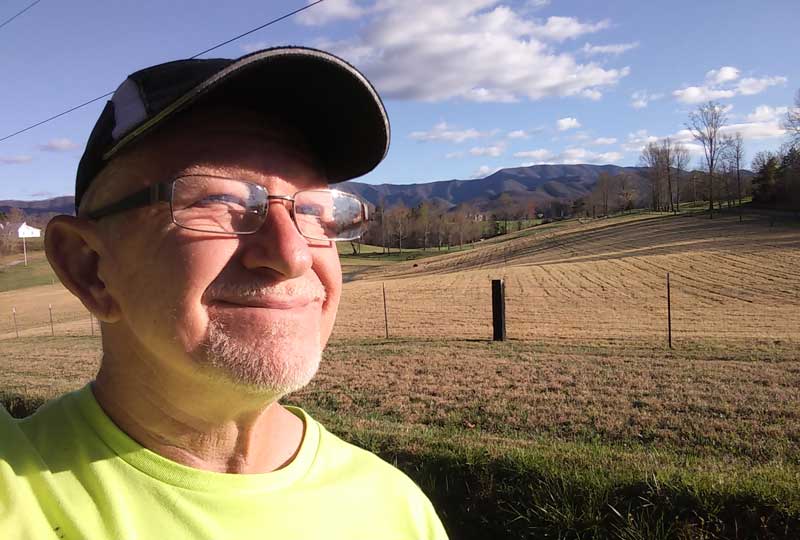When he was told he needed surgery to repair his brain aneurysm, East Tennessee resident Ron Jennings had a hunch he should seek a second medical opinion — and he was absolutely right.
Ron Jennings’ brain aneurysm was found in 2014 — by accident.
He was in the hospital for an unrelated matter, and the neurosurgeon delivered the news after a scan. “When I first heard that word, I was literally terrified,” Jennings said. “I’ve been through a lot of medical things in my life — I’m on my third pacemaker and got my first one at 28 — but when I heard the words ‘aneurysm’ and ‘brain,’ my blood went cold. I froze, I didn’t know where to go from there.”
It was three weeks before Jennings could see a neuroendovascular surgeon where he lives in East Tennessee. At his first appointment, the surgeon determined that his brain aneurysm measured 4.0 millimeters and did not require intervention. Jennings returned every six months until 2019, when an angiogram showed that the aneurysm had grown to 5.6 millimeters. The surgeon told him that he qualified for a procedure called a pipeline embolization — a procedure the surgeon had done a dozen or so times — and that Jennings should consider scheduling the procedure as soon as possible.
Jennings, however, was unsure. He brought up his concerns in a support-group Zoom meeting moderated by James Jackson, PsyD, and Caroline Lassen-Greene, PhD, of Vanderbilt University Medical Center’s Critical Illness, Brain Dysfunction and Survivorship Center. (Jennings has been in regular contact with the Center and with its co-director, Dr. E. Wesley Ely, since surviving post-surgery sepsis some years ago.)
“They recommended that I come to Nashville to Vanderbilt Neurosurgery in order to have Dr. Michael Froehler take a look,” Jennings said. “I asked my surgeon if he’d mind if I had a second opinion — he said he’d welcome it.”
Understanding brain aneurysms
Good news in Nashville
Chuckey, Tennessee, where Jennings lives, is 300 miles from Nashville, and due to his medical conditions, he’s unable to drive long distances. The members of his CIBS group offered to fetch him from home and drive him to his appointment with Froehler, hosting him overnight. “I mean, they wouldn’t let me lift a finger,” Jennings recalled. “They treated me like royalty.”
At his appointment at Vanderbilt, Jennings underwent another angiogram so that Froehler could get a better picture of his aneurysm. “Subsequent to that, I’d asked him to get us all of his prior imaging so that we could really investigate if the aneurysm had grown, since he’d been told that it had grown to a point that he’d need surgery.”
When Jennings returned home to Johnson City, he had a telemed conference with Froehler, who had good news to share. Though Jennings was fully expecting to hear that he’d need to return to Nashville for a surgical procedure, Froehler told him that his scan showed no growth from his original 4.0-millimeter measurement.
“For the aneurysm to have remained stable that whole time, it meant, at least in my opinion, that treatment was not indicated,” Froehler explained. “If somebody says you need surgery and then the answer is you don’t, that’s obviously good news. To me, ‘expertise’ doesn’t mean just doing your surgery expertly — it also means making informed recommendations about whether surgery is necessary based on expert judgement.”
A new path forward
“One of the things I really believe with all my heart is that if I’d gone through the procedure in East Tennessee, there’s a chance that I wouldn’t be here today.”
Jennings was immensely relieved, to say the least. “I asked Dr. Froehler about my limitations, and he said I didn’t have any,” he said. “And then I said, ‘Well can I go skydiving?’ He said yes — even though I never actually would. But I can’t tell you how excited I was to hear that.”
Jennings returns to Vanderbilt Neurosurgery for follow-up every two years, but is otherwise content knowing that his aneurysm is stable.
“One of the things I really believe with all my heart is that if I’d gone through the procedure in East Tennessee, there’s a chance that I wouldn’t be here today,” he said. “Going to Vanderbilt was a godsend — there’s no doubt in my mind about that.”

Personalized care for brain aneurysms
Vanderbilt Health’s Cerebrovascular Disease Program offers comprehensive care for a wide range of vascular conditions of the brain and spinal cord, including aneurysms, arteriovenous malformations and stroke.



